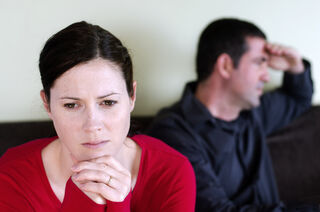Forgiveness
6 Reasons Not to Forgive, Not Yet
When we advise people to forgive and move on, we may make things worse.
Posted September 25, 2014 Reviewed by Jessica Schrader

I readily admit that there is a moral imperative to forgive; it is clear that forgiveness can be a powerful force of healing and reconciliation.
However, I must speak out when the advice from blogs, articles, books, and spiritual one-liners treats forgiveness as a panacea for hurt, pain, and “moving on” to a happier life—with nary a thought given to the many situations, people, and stages of injury where this counsel is not helpful. Worse, much of the counsel is downright offensive, suggesting that if we can’t forgive we are dwelling on the past, focusing on negative emotions, holding on to grudges, filled with retribution and revenge, addicted to adrenaline, marrying our victimhood, recoiling in self-protection rather than mercy, or poisoning ourselves with non-forgiveness.
These assumptions and judgments not only dismiss the real pain many people suffer; they discourage intelligent analysis of the traumas many people and groups experience. Further, the attitude behind these statements can shame people, making them think that something is wrong with going through a natural process of healing after injury or betrayal where forgiveness may not be the first (or second or third) step. The truth is that many people don’t forgive because it is not time to forgive—and taking the time to proceed at their own pace can be empowering, intelligent, and worthy. Simply put, it is alarming how un-psychological many psychologists can be; forgiveness is not the best medicine for all people all the time.
In fact, it may even make a person sick.
One person I spoke with echoed the thoughts of many: “When I was at my most precarious in my attachment to this life, I knew my new therapist was a keeper when I began to reveal the true history of what had been done to me, and she did NOT speak of forgiveness.”
6 Reasons Not to Forgive (Yet)
1. Urging forgiveness ignores the fact that anger naturally rises after being hurt and often needs to be integrated, not rooted out like some bacteria-borne illness.
Despite popular misconceptions, anger has a raw power in it that can be integrated—a power that can help a person stand up for themselves, make future injury less likely, and build a sense of empowerment and self-confidence. In fact, research shows that forgiving too readily can erode self-respect [1] and lead to greater relationship problems and partners that are more disagreeable. The point is that claiming some of our anger can be healing and productive.
Listen to the compelling voice of one woman: “I have walked away from the Big Forgive in my life. Every time I saw some version of that sermon—'Forgive in order to heal!' or 'You're only hurting yourself if you don't forgive!'—I debated what it meant for the family member who sexually abused me. I finally said, 'Screw it.' Sometimes I'm angry; sometimes I’m at peace.”
2. Encouraging people to let go of anger before the natural course of its process is suppressive and harmful.
When anger or revenge is suppressed, it gets internalized. What’s so bad about that? Internalized anger often shows up as powerful, painful, even crippling inner-criticism adding salt to the very wound we hope to heal. Additionally, suppressed anger can lead to depression, relationship difficulties, and a myriad of health problems including high blood pressure, heart problems, headaches, digestive problems, and more.
3. Counseling people to forgive when an injury is still recent risks dismissing the pain people are going through.
It may seem obvious that telling a person to forgive too quickly can be insensitive. However, not everyone gets it. I have worked with many people injured by a spouse or as a child who are told just that. The truth is, people have their own way of dealing with being hurt or betrayed and their timing differs depending upon the severity of the injury, their natural process, and the reactions of others with whom they share their pain. Promoting forgiveness without sensitivity to these details is not helpful; in fact, it can be hurtful and shaming. When is an injury “still recent?” Sometimes days, sometimes months, sometimes years.
4. Advising forgiveness can ignore the value of confronting an offender.
What if I told you that forgiving too readily makes it more likely that those who hurt you will hurt you again? This is exactly what professor James K. McNulty found—that partners who forgave their partners easily were almost twice as likely to be mistreated soon afterwards.
Further, confronting your offender may not only make your life better, it can also make the world safer for others. Simply put, bullying, abuse, assault, and discrimination can be abated, although not eliminated, by confrontation.
One person I spoke with said: “Even at a very basic level, calling someone out on what they did to hurt others, is one way to make those changes. So many injustices happen because no one says anything about them.”
5. The appropriateness of advising forgiveness depends upon who is asking whom to forgive.
Here’s a no-brainer: An abuser who tells a victim to forgive and let go may not have the victim's best interest at heart. But this is exactly what happens in many cases. Going further, if the person counseling forgiveness has an emotional, financial, or sympathetic connection with the one who injured you, then there is good reason to hesitate before trusting this counsel. This could be one parent suggesting you forgive the other, a religious institution suggesting you forgive the clergy, a politician who would like to “move on,” a friend who fails to make real amends or redress, or simply a person who can relate more to the injurer than to you. Essentially, where conflicts of interest are present, beware and slow down before trying to forgive.
6. Advising forgiveness, or letting go, to groups of people who have suffered sustained injustice is often ignorant and highly suspect.
Post after post and article after article preaches forgiveness while failing to address the injuries created by sustained social prejudice and marginalization. Instead of addressing these ills, forgiveness is discussed as if it were only an individual process—one person forgiving another. In a way, conventional thinking about forgiveness ignores some of the most profound injuries of our time, rendering this advice ignorant and even complicit with regard to the history of race, gender, and other issues of diversity:
- First, it ignores the great strides have been made by women, African-Americans, homosexuals, the disabled, and other marginalized groups by people who took the seed of their vengeance and anger and turned it into social action. They didn’t only practice letting go. They harnessed their rage, vengeance, and anger to lift their arms and voices for the benefit of many—and the development of America’s democratic project.
- Second, it ignores the fact that powerful prejudices still exist making these injuries not just a thing of the past. Shall we forgive an abuser in the middle of their abusive act?
- Finally, this counsel often comes from people or groups who either have more social power, or a vested interest in not having to look in the mirror at their culpability or redressing the ills many have suffered. It leads one to ask: Are these articles written by people who are out of touch with the history of perpetration over generations that others have to bear—a history that is still living today? Are they secretly, however unconsciously, hoping to absolve their guilt without redress? Clearly, we can’t be outraged by racism in Ferguson and then promote forgiveness and letting go as the only door to healing injury and injustice. liam Grier and Price Cobbs highlighted this problem in their seminal work, Black Rage, declaring, “The gravest danger we see is that unscrupulous people may use psychotherapy with blacks as a means of social control, to persuade the patient to be satisfied with his lot.”[2]
Forgiveness can be sweet and healing; that’s no lie. But please, before counseling forgiveness, take heed of the power and diversity of injuries as well as the nature of the person or group you are counseling. If we counsel forgiveness as a general practice, we turn a blind eye to so many—a blind eye that may put salt on wounds or add a layer of shame for those whom forgiveness is not the next step.
You might also like:
- Diagnosing Depression: In The Wake Of Robin Williams' Suicide
- The American Soul: Race and The Danger of New Age Spirituality
To find out about recent interviews, articles, and events, click here.
Schedule a one-on-one counseling session: dbedrickspeak@mac.com
Follow me on Twitter.
Find me on Facebook.
To read more of my posts on this blog, click here.
I am the author of Talking Back to Dr. Phil: Alternatives to Mainstream Psychology. Signed copies of the book are for sale on my website: www.talkingbacktodrphil.com.
References
[1] Laura B. Luchies, Eli J. Finkel, James K. McNulty, Madoka Kumashiro, “The doormat effect: When forgiving erodes self-respect and self-concept clarity.” Journal of Personality and Social Psychology, Vol. 98 (2010): 734–749.
[2] William H. Grier and Price M. Cobbs, Black Rage. (Eugene, OR: Wipf & Stock Publishers, 2000).




